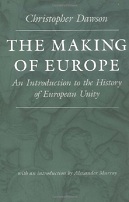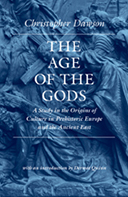An Introduction to the History of European Unity
First published in London 1932, The Making of Europe won Dawson enormous respect, leading to a fellowship of the British Academy, the Gifford lectures of 1947-8 and the Chauncey Stillman Chair at Harvard. As an interpretative introduction to what used to be known as the “dark ages”, The Making of Europe is still unsurpassed. It provides a coherent vision of the early medieval period which is profound, original, deeply sincere and recounted with enormous vigour and lucidity.
Central Themes
One of the main themes informing The Making of Europe is that the modern cult of nationalism obscures the common cultural identity of Europe. While this was evidently a topic of burning interest at the time the book was written in the early 1930s, it continues to be highly relevant today when the whole issue of the European Union is being called into question.
Dawson nowhere asserts that medieval Europe ever possessed any political, social or cultural unity, but rather that Christendom incorporated several distinct and earlier traditions which expressed themselves in the formation of characteristic and separate national cultures. At the same time, he argued, the ecclesiastical organisation of Christendom as a supranational entity transcended Europe’s cultural diversity through a common faith, a common intellectual education, a common moral law and a common system of organisation without which no concept of Europe, medieval or modern, would begin to make sense.
Evaluation of the Work
It is these and other central themes that give The Making of Europe its lasting value and interest, but beyond this it is quite remarkable to find how, despite its age, the more strictly scholarly aspects of the work have retained their accuracy. Medieval specialists have been struck by the breadth of erudition underlying succinct accounts of very specialised problems and, moreover, by the fact that Dawson’s judgements on important issues not only coincided with those of more recent scholarship, but were often better explained. Dawson’s analysis is always fresh and thought provoking.
In view of the fact that this study of this complex period is now almost eight decades old, it might be considered “dated”. But if we stopped reading books on this basis we would have stopped reading Gibbon long ago. In this sense, it could well be argued that The Making of Europe now has the status of a classic and that it should be read as such.
PRAISE FOR THE ORIGINAL EDITION:
“The Dark Ages lose their darkness, and take on form and significance. Thanks to the author’s erudition and marshalling of facts, we begin to have a notion of what it is all about.” – Aldous Huxley, The Spectator


